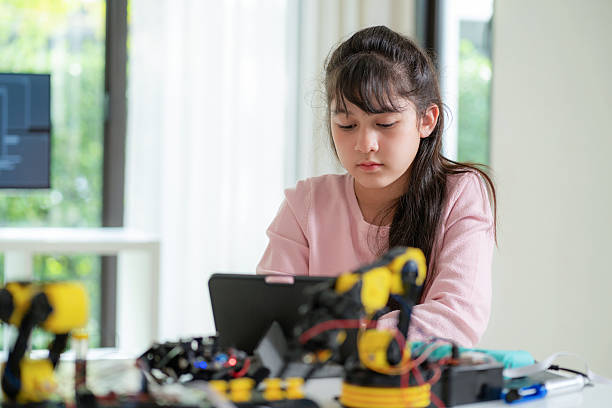Enroll in Python Coding Courses for Kids in New Jersey

The digital landscape is rapidly evolving, and programming skills have become increasingly essential for children’s future success. Python coding courses for kids in nj are gaining tremendous popularity as parents recognize the importance of providing their children with cutting-edge technological education. Python’s user-friendly syntax and powerful capabilities make it an ideal first programming language for young learners, offering them a solid foundation for understanding computational thinking and problem-solving methodologies.
In New Jersey’s competitive educational environment, parents are seeking comprehensive programs that not only teach coding skills but also prepare children for prestigious competitions and real-world applications. The integration of coding education with competitive opportunities like the world robot olympiad competition has created exciting pathways for students to showcase their programming abilities on international platforms. These competitions provide motivation and recognition for young programmers while fostering innovation, creativity, and technical excellence that extends far beyond traditional classroom learning.
The demand for quality programming education continues to grow as technology becomes more integrated into every aspect of daily life. Python coding courses for kids in nj offer structured learning experiences that combine theoretical knowledge with practical application, ensuring that children develop both the technical skills and the confidence needed to excel in our increasingly digital world.
Understanding Python’s Importance in Modern Education
Python has emerged as the most popular programming language for educational purposes due to its clean, readable syntax that closely mirrors natural language patterns. This accessibility makes Python coding courses for kids in nj particularly effective in introducing young learners to programming concepts without overwhelming them with complex technical barriers. Unlike many other programming languages that can intimidate beginners with cryptic symbols and complicated structures, Python allows children to focus on understanding fundamental programming logic and problem-solving strategies.
The language’s versatility extends across multiple domains, from web development and data analysis to artificial intelligence and robotics programming. This broad applicability means that children learning Python gain skills that are directly relevant to emerging technologies and future career opportunities. The connection between Python programming and robotics is particularly significant when considering preparation for competitions like the world robot olympiad competition, where programming skills are essential for creating intelligent, autonomous robotic systems.
Python’s extensive library ecosystem provides young programmers with powerful tools and resources that enable them to create sophisticated projects despite their beginner status. These libraries allow children to work with graphics, games, web applications, and even machine learning algorithms, giving them hands-on experience with cutting-edge technologies that were previously accessible only to advanced programmers.
Comprehensive Curriculum Design and Learning Progression
Effective Python coding courses are built around carefully structured curricula that guide children through progressive skill development stages. The learning journey typically begins with fundamental concepts such as variables, data types, and basic operations, presented through engaging, age-appropriate activities that capture children’s imagination and maintain their interest throughout the learning process. These foundational elements are crucial for building the logical thinking skills that underpin all advanced programming work.
As students advance through the program, they encounter increasingly sophisticated programming concepts including loops, conditional statements, functions, and object-oriented programming principles. The curriculum design ensures that each new concept builds upon previously learned material, creating a solid knowledge foundation that supports continued learning and skill development. Interactive projects and hands-on coding exercises reinforce theoretical concepts while providing immediate feedback and tangible results that keep children motivated and engaged.
Advanced curriculum components often include preparation for competitive programming challenges and robotics competitions such as the world robot olympiad competition. Students learn to work with sensors, motors, and control systems while developing the programming logic needed to create autonomous robotic behaviors. This competitive preparation not only enhances technical skills but also develops teamwork, project management, and presentation abilities that are valuable across all academic and professional endeavors.
The integration of real-world applications and current technology trends ensures that children understand how their programming skills connect to broader technological developments. Students might work on projects involving artificial intelligence, data visualization, or Internet of Things applications, giving them exposure to the technologies that are shaping our future and providing context for their continued learning journey.
Preparing for Competitive Excellence and Global Recognition
Participation in prestigious competitions like the world robot olympiad competition provides exceptional opportunities for young programmers to apply their skills in challenging, real-world scenarios. These competitions require students to combine programming knowledge with engineering principles, creative problem-solving, and team collaboration to design and build robotic solutions to complex challenges. The preparation process for such competitions significantly enhances the educational value of programming courses by providing clear goals and measurable achievements.
The world robot olympiad competition specifically emphasizes the importance of programming in modern robotics applications. Students must develop sophisticated control algorithms, sensor integration strategies, and autonomous decision-making systems that enable their robots to perform complex tasks without human intervention. This level of programming complexity pushes students to master advanced concepts while working within the constraints and requirements of competitive challenges.
Beyond the technical skills required for competition success, participation in events like the world robot olympiad competition develops crucial soft skills including project management, time management, teamwork, and communication. Students learn to work effectively in teams, divide responsibilities appropriately, and coordinate their efforts to achieve common goals within strict deadlines. These collaborative skills are increasingly important in professional environments and provide valuable preparation for future academic and career success.
The international nature of competitions such as the world robot olympiad competition also exposes students to diverse perspectives and approaches to problem-solving. This global exposure broadens their understanding of technology applications and innovation while building cultural awareness and international connections that can benefit them throughout their lives.
Hands-On Learning Through Project-Based Education
Modern programming education emphasizes project-based learning approaches that engage students in meaningful, real-world applications of their coding skills. Rather than simply memorizing syntax and following step-by-step tutorials, children work on comprehensive projects that require them to apply multiple programming concepts simultaneously while solving authentic problems. This approach ensures deeper understanding and better retention of programming concepts while developing the creative problem-solving skills that are essential for success in technology fields.
Project-based learning in programming courses often begins with simple applications such as creating interactive games, designing digital art programs, or building basic calculators and utilities. As students develop confidence and skills, projects become more sophisticated and may include web applications, mobile apps, or robotics programming challenges. The progression from simple to complex projects mirrors the natural learning process while providing students with a portfolio of work that demonstrates their growing capabilities.
The connection between project-based learning and competitive preparation is particularly strong in robotics-focused programs. Students working toward participation in competitions like the world robot olympiad competition engage in extended projects that require sustained effort, iterative improvement, and collaborative problem-solving. These long-term projects provide authentic learning experiences that closely mirror professional development processes while building the persistence and determination needed for competitive success.
Collaborative project work also introduces students to modern software development practices including version control, code documentation, and team-based programming methodologies. These professional skills are increasingly important in technology careers and provide valuable preparation for advanced computer science studies and professional development opportunities.
Individual Attention and Customized Learning Paths
Recognizing that children learn at different paces and have varying interests and aptitudes, quality programming education programs provide individualized attention and customized learning paths that maximize each student’s potential. Small class sizes and experienced instructors enable personalized instruction that addresses specific learning needs while challenging students appropriately. This individualized approach ensures that no student falls behind while preventing advanced learners from becoming bored or disengaged.
Customized learning paths allow students to explore their particular interests within the broader programming curriculum. Some students may gravitate toward game development, while others prefer web applications, data analysis, or robotics programming. Flexible curriculum design accommodates these preferences while ensuring that all students master essential programming fundamentals. This personalization increases engagement and motivation while helping students discover their specific technology interests and potential career directions.
For students interested in competitive programming, specialized tracks provide intensive preparation for events such as programming contests, robotics competitions, and technology fairs. These advanced tracks offer accelerated learning opportunities and specialized instruction that prepares students for the unique challenges and requirements of competitive environments. The focused preparation helps students achieve their maximum potential while building confidence and competitive skills.
Assessment and progress tracking systems provide regular feedback to both students and parents, ensuring that learning objectives are being met and that students are making appropriate progress toward their goals. This ongoing evaluation allows for timely adjustments to learning plans and provides recognition for achievements that maintain motivation and engagement throughout the learning process.
Career Preparation and Future Opportunities
Programming education provides children with valuable preparation for future academic and career opportunities in technology fields. The skills developed through comprehensive programming courses extend far beyond coding itself, encompassing logical reasoning, systematic problem-solving, creativity, and analytical thinking that are valuable across many disciplines and professions. Early exposure to programming concepts gives children significant advantages in STEM education and prepares them for the technological literacy requirements of virtually all modern careers.
The rapid growth of technology industries creates numerous career opportunities for individuals with strong programming backgrounds. From software development and web design to data science, artificial intelligence, and robotics engineering, programming skills open doors to exciting and well-compensated career paths. Children who begin programming education early develop the foundational knowledge and skills needed to pursue these opportunities while building confidence in their technological abilities.
Competition experience, particularly in prestigious events like international robotics competitions, provides exceptional preparation for future academic and professional success. The project management, teamwork, and technical skills developed through competitive preparation are highly valued by universities and employers. Students with competition experience often have significant advantages in college admissions, scholarship applications, and job interviews throughout their careers.
Conclusion
The decision to enroll children in comprehensive programming education represents a strategic investment in their future success and personal development. Python coding courses for kids in nj provide exceptional opportunities for young learners to develop essential technological skills while building confidence, creativity, and problem-solving abilities that benefit them across all areas of life. The combination of structured curriculum design, hands-on project work, and competitive preparation creates comprehensive learning experiences that prepare students for academic excellence and future career success.
The integration of competitive opportunities, particularly prestigious international competitions, adds significant value to programming education by providing clear goals, measurable achievements, and global exposure that enhances both technical skills and personal development. Students who participate in these challenging competitions develop advanced programming abilities, professional-level project management skills, and the confidence needed to tackle complex technological challenges throughout their lives.
As technology continues to reshape every aspect of society, children with strong programming backgrounds will have distinct advantages in education, career opportunities, and personal empowerment. The comprehensive programming education provided by quality institutions ensures that students develop both the technical expertise and the broader skills needed for success in our increasingly digital world. Brainy n Bright continues to lead the way in providing exceptional programming education that combines rigorous academic content with engaging, hands-on learning experiences that inspire lifelong learning and technological innovation.




